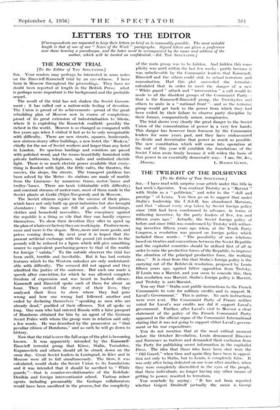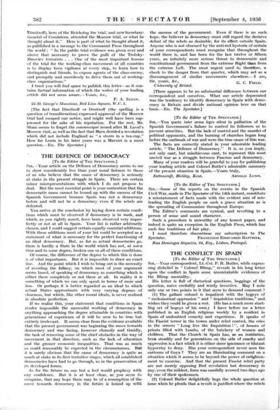THE TWILIGHT OF THE BOLSHEVIKS
[To the Editor of THE SPECTATOR.] have read with surprise your article under this title in last week's Spectator. You contrast Trotsky as a "Marxist " with Stalin as a " politician,- and refer to the " skill and prestige " of Lenin. You then go on to suggest that under Stalin's leadership the U.S.S.R. has abandoned Marxism, and that " almost every step taken by Soviet foreign policy since 1933 had been condemned in advance, in terms of withering invective, by the party leaders of five, ten and fifteen years ago." Actually, the Soviet foreign policy of before and since 1933 was condemned by Trotsky with wither- ing invective fifteen years ago when, at the Tenth Party Congress, a resolution was passed on foreign policy which. included these words : The possibility of new relations. based on treaties and conventions between the Soviet Republic and the capitalist countries should be utilised first of all in order to raise the productive forces of the Republic, to improve the situation of the principal productive force, the working class." It is clear from this that Stalin's foreign policy is the carrying out of the Bolshevik resolution, proposed by Lenin fifteen years ago, against bitter opposition from Trotsky. If Lenin was a Marxist, and you seem to concede this, then this resolution was Marxist, Stalin's foreign policy is Marxist, and Trotsky is anti-Marxist.
You say that " Stalin sent public instructions to the French Communists to vote for military credits and to support M. Laval's Government." This is untrue. No such instructions were ever &mt. The Communist Party of France neither voted for Laval's war credits nor did it support Laval's government. Further, after Laval's visit to Moscow a clear statement of the policy of the French Communist Party appeared in the official organ of the Communist International stating that it was not going to support either Laval's govern- ment or his war expenditure.
You do not mention that at the most critical moment before the October Revolution, Lenin denounced Zinoviev and Kamenev as traitors and demanded their exclusion from the Party for publishing secret information in the capitalist Press. The idea that those who have been shot were the " Old Guard," when time and again they have been in opposi- tion not only to Stalin, but to Lenin, is completely false. It was only after being defeated on one issue after another, when they were completely discredited in the eyes of the people, that these individuals, no longer having any other means of getting to power, resorted to terrorism.
You conclude by saying : " It has not been reported whether Grigori Dmitroff (actually the name is Georgi Dimitroff), hero of the Reichstag fire trial, and noivSeeretary _ . General of Comintern, attended. the Mriscow trial, or what he thought abo_utit." Here is part of what he thought about it, as published in a message to the Communist Press throughout the world : " In the public trial evidence was given over and above that necessary to prove the guilt of the Trotsky- Zinoviev terrorists . . . One of the most important lessons of the trial for the working-class movement of all countries is to display keen vigilance at every step, to learn how to distinguish real friends, to expose agents of the class-enemy, and promptly and mercilessly to drive them out of working- class organisations."
I trust you will find space to publish this letter—as it con- tains factual information of which the writer of your leading article did not seem aware.—Yours, &c.,
P. A. SLOAN.
22 St. George's Mansions, Red Lion Square, TV .C. 1.
[The fact that Dimitroff or Dmitroff (the spelling is a question of transliteration) expressed approval of the Moscow trial had escaped our notice, and might well have been sup- pressed for the sake of his reputation. For the rest, Mr. Sloan seems to forget the communiqué issued after M. Laval's Moscow visit, as well as the fact that Marx derided a revolution which did. not include England as " a storm in a tea-cup.',' How far Lenin in his later years was a Marxist is a moot question.—En. The Spectator.]







































 Previous page
Previous page